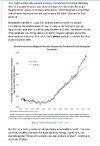Bill M
Self Funded Retiree
- Joined
- 4 January 2008
- Posts
- 2,132
- Reactions
- 740
with defined benefit plans, what happens if you die.
Does the spouse still recieve payments,
I had to do a read up on the facts sheet. The answer is yes, it is passed on to your spouse. I also checked the employer sponsored part of the deal, it is in fact 2 and a half times final salary not 3 as I stated before.
Virtually all employees who were employed by the NSW state Government prior to 1993 when this fund was closed off to new entrants are still paying into these funds. That amounts to 10's of thousands of people.
---
It is one of the largest superannuation schemes in Australia, managing more than 136,022 accounts and more than $30 billion in assets at 30 June 2010
---
Link to the Facts Sheet



